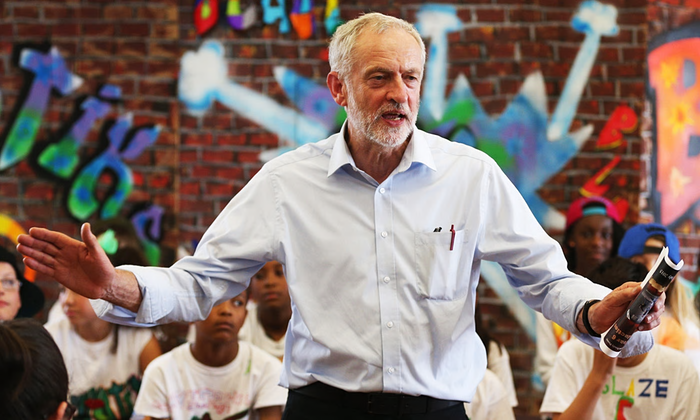
(yes it does exist!
- buried in the housing section of The Guardian a pro-Corbyn article.
A super piece too. Ed)
.
If you want to figure out exactly what’s wrong with politics today, you could do worse than follow the Labour leadership race. Post-election, it looked as though we were set for a stultifying few months of watching an ever-dwindling membership choose between three near-identical candidates. Instead, with the late inclusion of Jeremy Corbyn into the race, the contest has hotted up for all the wrong reasons.
Politicians, former advisors and journalists from the right and notional left have been driven to paroxysms at the thought that Corbyn may win, as a result of inspiring thousands of formerly apathetic voters to register to support him, off the back of policies he believes in.
On housing, Corbyn’s policies align with the wish list of almost anyone hit by the housing crisis: lift the housing revenue account cap to allow councils to build council and social housing (a manifesto pledge also endorsed by Andy Burnham), longer tenancies, private landlord registration, rent regulation and private rents linked to average local earnings. “It has become clear that when housing provision is left purely to market forces most of our young people simply cannot afford to get a foot on the rung of the market’s so called housing ladder,” Corbyn said.
Burnham’s policies include more building, right to buy with caveats, and building “rent to own” properties. Former housing minister Yvette Cooper criticised Ed Miliband for not focusing more on first-time buyers during the election, and committed to building more without clarifying what tenure those homes would be. I couldn’t find one mention of housing on Liz Kendall’s website.

For anyone who has been hit by the housing crisis, Corbyn’s proposals seem perfectly reasonable and most likely to help people and temper the effects of rising rents, house prices and dwindling social and council housing stock. Measures to make buying a first home easier by ploughing government cash into an overinflated housing market only help in the short term, and does nothing to address the huge gap between most wages and housing costs in the south.
But instead, Corbyn has been attacked for having supposedly outlandish policies, and the Labour party panics about the fact that these policies are attracting fervent support from voters who felt alienated from what Labour and the Conservatives had to offer during the election. Rather than consider that perhaps it is the party that needs to change, Labour loyalists have argutragedy is that Corbyn’s proposals are modest, and directly address issues rather than tiptoeing around problems already in place. The housing crisis has rumbled on for years now, causing both a generational divide between the young and the old(er), but also a much starker divide between the rich and the poor. This week, a YMCA report outlined how housing benefit cuts for 18-21-year-olds could leave thousands of vulnerable young people homeless, a policy that the Conservatives are implementing, and Labour have previously supported. A YouGov poll in April 2014 showed that two-thirds of Londoners felt more social housing should be built, yet half the candidates are wary of calling for this.
Chasing public opinion by way of focus groups and a distorted view of what will translate to electoral success didn’t serve Labour well in the election, where they disastrously forfeited an entire country to the SNP, and many of their cabinet members lost seats. Perhaps rather than continuing to chase the same pool of centrist voters as the Conservatives, Labour should ask why they lost so many working class voters, so many young voters, and why so many people in traditionally Labour areas simply didn’t turn out to vote.
The housing crisis could begin to be solved with Corbyn’s proposals – the fact that they are seen as radical, rather than pragmatic, says far more about the state of modern politics, and why apathy among the young, vulnerable and working class is so high than many people in the Labour party are willing to admit.
ed that the party should reflect the chimeric “public opinion” – albeit not the opinion of the public that find in Corbyn a reason to support a Labour politician.
The tragedy is that Corbyn’s proposals are modest, and directly address issues rather than tiptoeing around problems already in place. The housing crisis has rumbled on for years now, causing both a generational divide between the young and the old(er), but also a much starker divide between the rich and the poor. This week, a YMCA report outlined how housing benefit cuts for 18-21-year-olds could leave thousands of vulnerable young people homeless, a policy that the Conservatives are implementing, and Labour have previously supported. A YouGov poll in April 2014 showed that two-thirds of Londoners felt more social housing should be built, yet half the candidates are wary of calling for this.
Chasing public opinion by way of focus groups and a distorted view of what will translate to electoral success didn’t serve Labour well in the election, where they disastrously forfeited an entire country to the SNP, and many of their cabinet members lost seats. Perhaps rather than continuing to chase the same pool of centrist voters as the Conservatives, Labour should ask why they lost so many working class voters, so many young voters, and why so many people in traditionally Labour areas simply didn’t turn out to vote.
The housing crisis could begin to be solved with Corbyn’s proposals – the fact that they are seen as radical, rather than pragmatic, says far more about the state of modern politics, and why apathy among the young, vulnerable and working class is so high than many people in the Labour party are willing to admit.
source

More Stories
Navalny’s death used to hide western failures in Ukraine and their support for Israel’s genocide
Gifts from Gaza
Vulture capital circles over the corpse of Ukraine…